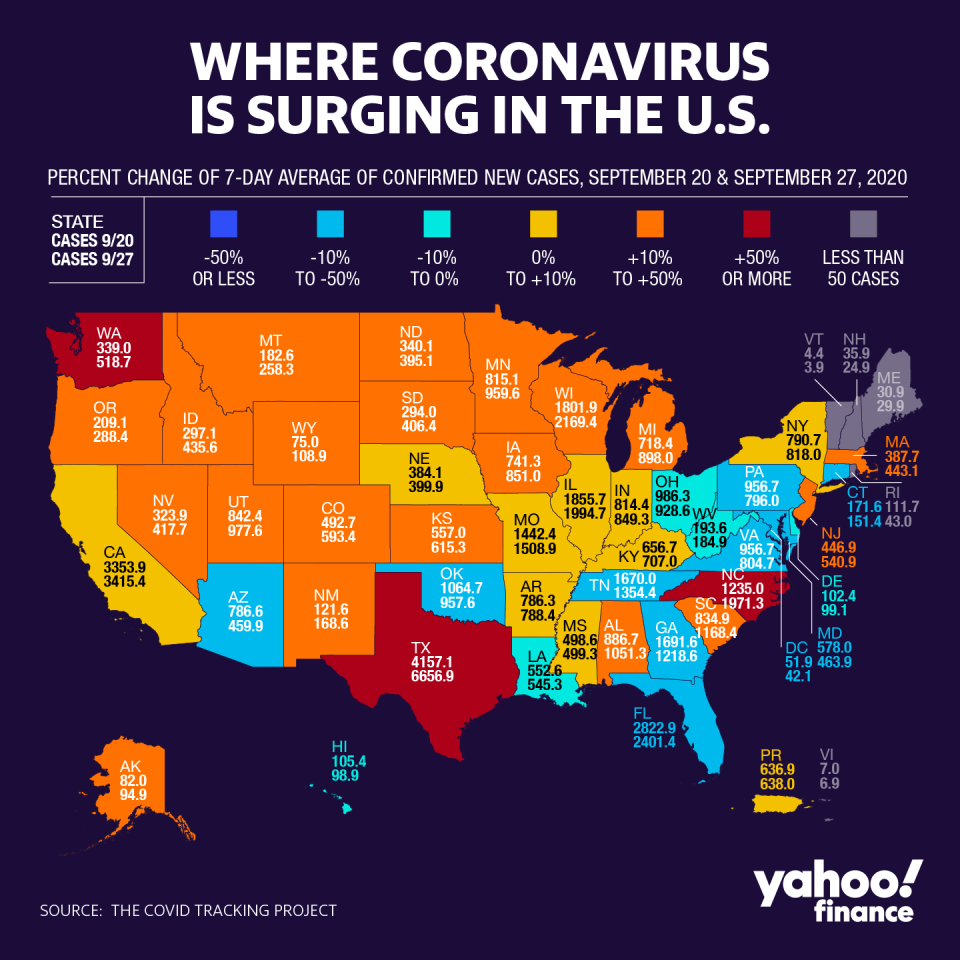How companies, health providers are moving to address COVID-19's toll on mental health
Increased awareness about mental health needs in the U.S. — and companies willing to address the subject — have been on the rise during the COVID-19 pandemic, providing a much-needed boost to a trend that began with the opioid crisis.
The U.S. Centers for Disease Control and Prevention (CDC) released data showing at least one-third of Americans show signs of clinical anxiety or depression. Separately, a recent study from Philadelphia-based behavioral health platform NeuroFlow shows a rapid spike in searches for therapists.
Amid a boom in digital services ranging from educational and guidance apps to virtual visits, the renewed emphasis on mental health underscores how the fallout from the coronavirus outbreak has put mindfulness in the spotlight. It’s also spurred at least one major insurer to make mental health a primary focus.
Cigna (CI) CEO David Cordani told Yahoo Finance the pandemic has both reinforced and accelerated an internal pivot toward being “multidimensional,” and doing a better job assisting employers in taking care of their increasingly stressed workers.
“A vibrant company needs healthy, productive, present — both physically and mentally— highly engaged coworkers,” Cordani said in an interview.
Recently, Cigna conducted a study of resilience in the U.S., creating a new Resilience Index to determine the country’s ability to recover from challenges quickly.
The sobering results found that at least 60% of Americans are at risk, underscoring the challenges as the world grapples with an outbreak that isn’t even remotely under control yet. In the U.S. workforce — a group increasingly affected by high unemployment and ongoing furloughs — only 37% are considered resilient, Cigna’s data showed.
“It’s understandable that the challenges Americans are confronting, whether related to the pandemic, social injustice, the economic climate or other issues, would take a toll on children and working adults alike,” he said.
Resilience can also affect an employee’s sense of belonging and efficiency at work. According to the health giant, workers with access to mental health services are more likely to be resilient. Separate studies have also supported this idea, with employers expecting to spend more on mental health services in the upcoming year.
No longer ‘intimidated’ by therapy

Traditionally, a shortage of in-network behavioral health professionals has lead to low utilization of services, especially because low reimbursements have been a key reason therapists have chose to stay out of network.
Yet increasing the need and availability of new virtual platforms could help companies meet their goal of spending more on employee mental health.
NeuroFlow, which saw clicks to its app more than double in April when compared to January, is hoping a silent epidemic of depression, anxiety and social isolation gets more attention.
“Prior to COVID-19, 57% of Americans were undiagnosed or untreated for a mental illness. It’s our hope that if there’s one positive in all of this, greater awareness begins to encourage more people to seek clinical treatment for underlying symptoms,” said Julia Kastner, NeuroFlow’s vice president of product, in a statement.
Some of the need for increased mental health needs is also coming from those who care for others, known as caregivers of the family or community. A new study from Blue Cross Blue Shield Association showed this translated to poor physical health, and turning to harmful coping mechanisms.
About 14% turned to alcohol, 18% to medication and 50% to increased food consumption to cope, according to the BCBSA study.
The trend is presenting increased business opportunities for companies catering to mental health, and not just via virtual visits.
United Health Group (UNH), with its virtual mental health company Sanvello, recently joined forces with U.S. gold medal gymnast Aly Raisman to better provide mental health services and awareness. The app offers a variety of tips, guides, group sessions and tracking strategies in addition to virtual visits.
“People watching might be intimidated to actually call a therapist,” Raisman recently told Yahoo Finance, explaining the app is easy to access on any smartphone.
Veteran telehealth companies like MDLive are also moving in on the action. CEO Charles Jones told Yahoo Finance recently that behavioral health services have seen a 300% growth during the pandemic.
All told, payors are going to have to figure out how to support mental health services beyond office or virtual visits — and what that translates into in terms of overall health care spend.
It’s one reason why Cigna has committed to a “multidimensional” strategy to health care, Cordani said. That includes partnering with entities that could be seen as competitors, and keeping an open mind in its moves to address the sudden surge in new demand.
“This environment, inclusive of the resiliency dialogue... and need for new innovation plays really well for us,” he said.
More from Anjalee:
Redfield: CDC 'preparing earnestly' for vaccine in November, December
India's tech giants navigate 'literally spiking' WFH demand, H1-B fears in coronavirus era
How protests spurred Corporate America into action on race, inequality
Read the latest financial and business news from Yahoo Finance
Follow Yahoo Finance on Twitter, Facebook, Instagram, Flipboard, SmartNews, LinkedIn, YouTube.

 Yahoo News
Yahoo News 
